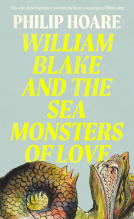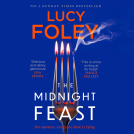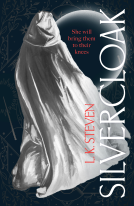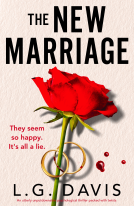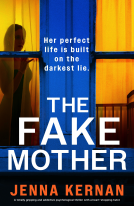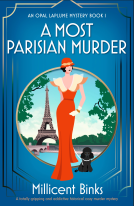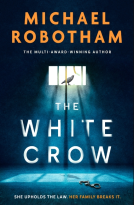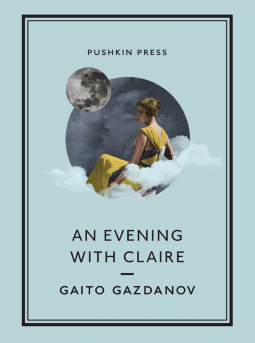
An Evening with Claire
by Gaito Gazdanov
This title was previously available on NetGalley and is now archived.
Send NetGalley books directly to your Kindle or Kindle app
1
To read on a Kindle or Kindle app, please add kindle@netgalley.com as an approved email address to receive files in your Amazon account. Click here for step-by-step instructions.
2
Also find your Kindle email address within your Amazon account, and enter it here.
Pub Date 19 Oct 2021 | Archive Date 7 Oct 2021
Pushkin Press | Pushkin Collection
Talking about this book? Use #AnEveningwithClaire #NetGalley. More hashtag tips!
Description
Two old friends meet nightly in Paris, trading conversational barbs and manoeuvring around submerged feelings. Throughout the ten years of their separation, thoughts of Claire lingered persistently in Kolya's mind. As the imagined romance finally becomes real, Kolya is thrown into recollections of formative moments from his youth in Russia, from his solitary early years through military school and service in the White Army in the Civil War, all leading to this union with Claire.
The first novel by the celebrated Russian master Gaito Gazdanov, An Evening with Claire is a lyrical, finely crafted portrait of a lost innocence and a vanished era.
Advance Praise
• "The Gazdanov revival... is nothing short of a literary event"--TLS
• "Pushkin Press is to be congratulated on reviving an author who is as relevant now as ever"--Spectator
• "A fascinating writer"--Irish Times
• "Gazdanov's work is the perfect fusion of the Russian tradition and French innovation"--London Review of Books
Available Editions
| EDITION | Other Format |
| ISBN | 9781782276050 |
| PRICE | US$18.00 (USD) |
| PAGES | 256 |
Featured Reviews
 Reviewer 876149
Reviewer 876149
An Evening with Claire was Gaito Gazdanov’s first novel, published in France in 1930. Gazdanov was one of the “unnoticed generation,” marginalised, rootless, younger writers who fled Russia in the years following revolution and brutal civil war. He washed up in Paris in the early 1920s where, after a string of lean years, driving a taxi gave him time to write. Gazdanov’s debut’s an intricate, semi-autobiographical piece briefly posing as a classic tale of unrequited love and desire. Desire plays a part here but it’s a desire for place and something else, something yearned for, almost intangible, that can only be accessed through memory. The central character Kolya’s a young Russian living in Paris, he’s adrift and isolated, apparently obsessed with Claire, a married woman, and his long-lost, first love. But Claire’s a near-mythic figure for Kolya, a potent symbol of the past. Her active role here’s a minor one, a catalyst for the flood of recollections to come.
The bulk of Gazdanov’s narrative’s a vivid recreation of Kolya’s history: a settled childhood in a cultured, middle-class family ruptured by his father’s early death; unruly, challenging school years; a growing sense of alienation; and the unexpected decision to fight in the Russian Civil War, when he was barely sixteen years old. It’s a beautifully-constructed story, atmospheric and compelling. A series of impressionistic snapshots, filled with striking images and anecdotes, that demonstrate why Gazdanov was sometimes dubbed the Russian Proust. Although Gazdanov hadn’t actually read Proust, and his writing features a decidedly hard-edged element that Proust’s lacks.
The scenes of Kolya’s childhood have a wonderful, fairy-tale quality but I was most impressed by the episodes set during the Civil War. The deeply self-analytical Kolya’s representation of wartime veered between introspective, understated observations and meticulously-drawn vignettes centred on his fellow soldiers. There are jolts of absurd or bleak humour in his depiction of army life, interspersed with lyrical descriptions of landscapes and wildlife that highlight the strangeness, the uncanny aspect of war. Gazdanov makes it clear that war can shatter everything around it, but shows how easily it can also become mundane - experiences of violence and death too commonplace to question. The emphasis throughout is very much on Kolya’s personal perceptions and encounters, there’s little in the way of historical detail, perhaps because Gazdanov’s addressing readers who shared similar histories. It’s possible that may be challenging for anyone unfamiliar with the period but I think the sheer force of the writing makes up for the more elliptical content. Apparently Gazdanov’s work’s considered difficult to translate, I can’t comment on that, all I can say is I found Bryan Karetnyk’s recent translation fluid and convincing.
Thanks to Netgalley and Pushkin Press for the arc
 Mallika R, Reviewer
Mallika R, Reviewer
My thanks to Pushkin Press and NetGalley for a review copy of the book.
The first book by Russian émigré writer Gaito Gazdanov, An Evening with Claire (1929), opens in Paris where we are introduced to our narrator and main character, Nikolai Sosedov or Kolya. After ten years, Kolya has been reunited with his first love, Claire, one he has never ceased loving, and has always dreamt of. As the romance he has imagined for so long becomes real, the unattainable dream-like status Claire has always had in Kolya’s thoughts fades away. But his thoughts of the Claire of his dreams, or rather of a dream-like image of Claire that he needs to always have, lead him back to times past—in fact all the way back to his childhood in Russia.
In a flowy narrative, with loosely connected memories of different people, incidents and times in his life, we follow Kolya from his idyllic childhood, which lasted somewhat briefly for he lost his father when he was only eight; his life with his cold but admirable mother; in the gymnasium and military academy; carefree times spent wandering in his grandfather’s orchards in the holidays; his meeting with Claire; and ultimately the civil war in which he joined the White Army and eventually found himself having to leave Russia. Throughout these recollections what Kolya tells us is his perceptions of scenes he witnessed, incidents he experienced, and people he met—at different times in his life, these were from all walks of life, his own family, fellow students, teachers and fellow soldiers.
Kolya makes for an interesting, yet puzzling character; there are some things he feels strongly—like the loss of his father (I’ve perished with him, so too my fabulous ship, and the island with white buildings which I discovered in the Indian ocean), or even an incident involving Claire’s mother’s rather harsh words to him, while in others, whether it is the death of his sisters (here his reaction seemed more to his mother’s sorrow which made him almost guilty to be alive) or the pointless and seemingly endless injury and loss of life during the war which he seems almost numb to. Moments of ‘perfect happiness’ are perhaps few, like when he is a child:
…sitting on Father’s knees and glancing from time to time at mother’s placid face—for she was usually by his side—I experienced true happiness, the sort that only a child or man possessed of extraordinary spiritual strength can feel.
Or amidst nature or in a book:
In that moment, as whenever I was truly happy, I vanished from my own consciousness. It could happen in a forest, in a field, on a river, by the seashore; it could happen while I was reading a captivating book.
But for the most part, Kolya seems to live within himself—in his inner life, as opposed to the outer one—and so looks at most others, in a rather detached manner. In his memories we meet a range of personalities, warm and cold, brave and cowardly, learned and hypocritical, as well as some colourful characters.
What defines Kolya perhaps is his constant search for something—the adventure on the Indian Ocean in his childhood games with his father, the search for ‘change’ , to be somewhere which alone leads him to join the White Army (he has no belief in their cause or for that matter, in the Reds’), and so too, is the dream of Claire—which we soon realise means not so much the person but an unattainable dream which he must always have to carry him on, and forward. At one point, Kolya observes of a fellow student, Vasily Nikolaevich, he was always searching for his truth, wherever he happened to be. And that seems to apply to Kolya too, always needing to have that dream he is in pursuit of.
While I enjoyed the writing in the book (the translation was excellent, and it never felt that I was reading one), and the different memories through which Kolya takes us through (his childhood memories are lovely and warm while those of the war once again make one question the point of it), I found myself struggling with how to understand the book. But thinking over it all, Kolya perhaps represents the experience of Gazdanov himself, and perhaps many other emigres, their home taken away from them (probably) forever, left only with snatches of memory of times past, and ‘Claire’, that unattainable dream he is always in search of, the only thing they can hold on to.
(This is probably more of an exercise in my trying to understand the book than a review per se, I know, but these were the thoughts that came to mind).
 Reviewer 884821
Reviewer 884821
The atmosphere of the book is really beautiful, and the wistfullness seems to permeate all aspects of Gazdanov's prose. The translation is able to keep the full context of the piece—the early twentieth century and all forms of revolution brewing. 4/5 stars, unfortunately not something I've been approved to write a full review of at my publication
 Reviewer 823951
Reviewer 823951
Two old friends meet nightly in Paris, trading conversational barbs and manoeuvring around submerged feelings. Throughout the ten years of their separation, thoughts of Claire lingered persistently in Kolya's mind. As the imagined romance finally becomes real, Kolya is thrown into recollections of formative moments from his youth in Russia, from his solitary early years through military school and service in the White Army in the Civil War, all leading to this union with Claire.
